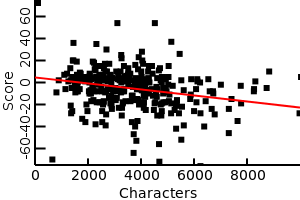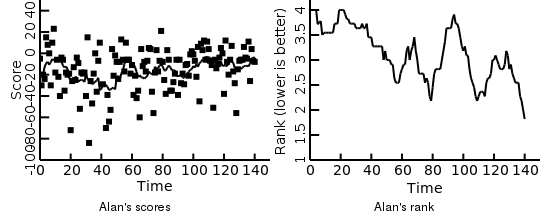Quite Interesting facts about QI scores Modelling for fun and profit
The game show QI has a very interesting (and well documented) scoring system, but I’ve always felt QI could easily be “gamed”. For those of you who don’t know QI, it is a popular game show with Stephen Fry and Alan Davies. The whole show revolves around quite interesting facts and doesn’t take itself seriously (it does take the facts seriously though). Because players lose points when they say the wrong thing I have always had the sneaking suspicion that the game could easily be “gamed” by not saying anything, so let’s take a closer look at the scores.
Relation between scoring and talking
First, let’s explore whether saying more really results in lower scores. For this I needed the amount people were talking (represented by total number of characters in their sentences) and their scores. Luckily I found this website with transcripts and another website with all QI scores from all the episodes. I am afraid the transcripts only cover the first 8 series though, so I don’t have all the data. If we plot these and perform a linear regression (with R) we get the following picture:

Although the relationship is fairly weak, it is (statistically) highly significant, showing that saying less and having a higher score are correlated.
Alan Davies (permanent panel member)

Finally, lets take a look at Alan’s performance over time. Since Alan is a permanent member we have his scoring data over time. On the left hand side we have his actually scores, with a running average (black line) and the right hand side the running average of the actual position he ended up in (lower is better). From the scores we can see that he started out quite good, then the scores got lower and slowly started rising again from show 40 onward. If we look at his rank every game there seems to be clear improvement over time. The apparent discrepancy of higher scores in the beginning but worse rankings is presumably because all other players also scored higher in the beginning.
This leads us to a frightening conclusion: if Alan keeps going like this he might end up winning every week :)
Hope you found this short overview quite interesting! If people have suggestion on other possible interesting facts in the data feel free let me know :).